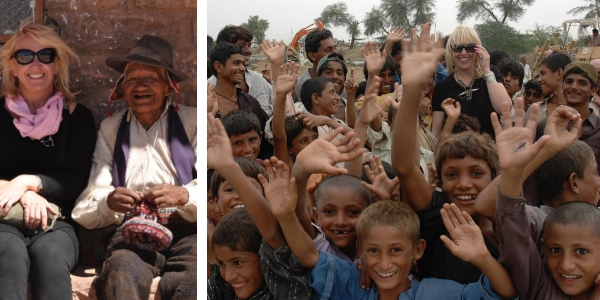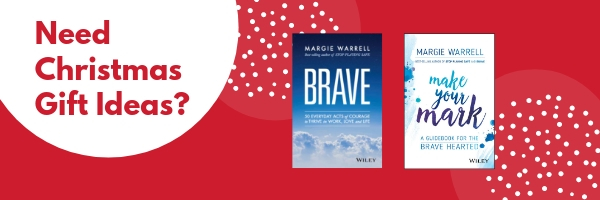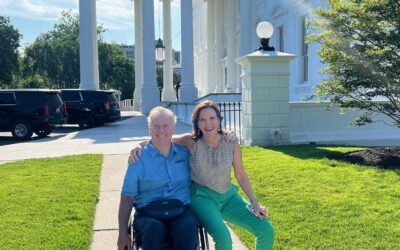Wired into our psychological DNA is the desire for security, safety
Research shows that people who have connected to a purpose that is greater than themselves– bolstering their ego or furthering their power –are happier, more contented, enjoy richer relationships and are more resilient in the face of adversity than those who haven’t. They are also far more inspiring leaders.
Linda Cruse is one such leader, albeit not a conventional one. Described by Richard Branson as someone who “makes the impossible, possible,” Linda has spent the last two decades living out of a suitcase on the frontlines of
As Linda shared with me during our very inspiring conversation on my Live Brave Podcast, “Tapping into the expertise, entrepreneurial skills, ingenuity and passion within business makes a far bigger impact than any size check.” Organizations

Of course, we’re not all like Linda – whose book Leading on the Frontline gets to the heart of courageous leadership. Nor do we all have some epiphany moment as she did many years ago when she experienced temporary blindness and realized she couldn’t go on as she was. But just because most of us aren’t struck by a “blinding stroke of insight” that compels us to over-haul our life doesn’t mean we can’t take it upon ourselves to take a hard look at how we’re “doing life.”
Gallop employee engagement surveys consistently find that a large majority of people go to work each day pushed along more by inertia than inspiration. In a recent study in the U.K., over 90% of respondents reported that they’re often just going through the motions, as though on auto-pilot, feeling anything from mildly disinterested to outright disillusioned by how they’re spending the best hours of their days and best years of their lives.
Of course, it’s easy to get caught in the trap of thinking we don’t have any choice. That’s rarely the case. More often it’s a convenient rationalization that spares us the inconvenience of making a change. “The truth is, we always have a choice,” Linda said, recounting a stark moment of choice that she faced when she arrived in Thailand after the devastating 2004 Tsunami that killed 230,000 people and left millions more homeless.
I was in the taxi heading to the worst hit area. There was devastation everywhere. I asked the taxi driver to pull over as emotionally I didn’t know I could go on to the survivors camp where 5,000 people in a terrible state were waiting for help. I got out of the car and sat on the edge of a cliff overlooking the sea. It was full of dead bodies, just floating. I felt overwhelmed by the enormity of the suffering and what I was heading into. Part of me wanted to tell the taxi driver to take me back to the airport. But then I flashed back to when I was 18, in nurse training, and my Matron said to me: ‘It’s not about you. It’s about what you’re here to do… to be of service and help others.’”
We all arrive at moments in our life where we are torn between retreating to the safety of the known and the possibilities of the unknown – between comfort and contribution; between security and service; between seeking admiration and looking good and risking status and doing good. Between love and fear.
We don’t need to look very far to see that the psychological tug toward consolidating power, protecting pride and safeguarding status often wins. Yet it begs the question: At what cost to the state of our heart? And at what cost to the hearts of those whom we might otherwise serve?
The fact that millions of Americans are wealthier today than ever before yet suffer higher rates of depression and greater loneliness (with young adults feeling the most alone), tells us that something is amiss. It’s wonderful to have wealth – it buys us choices and enables us to do more good. But if our lives revolve solely around the accumulation of it, we can end up living a life of immaculate mediocrity – living superficially in the shallows and starved for a purpose that transcends anything anything fame or fortune or Facebook fans can provide. As German physician Albert Schweitzer once said, “I don’t know what your destiny will be, but one thing I know: the only ones among you who will be really happy are those who will have sought and found how to serve.”
No one can discern the right path for you. That’s your responsibility alone. However, whatever path you choose, it’s imperative to regularly reflect on whether the payoff you get from staying on your current life course is worth what you’re giving up. Too often the short term gratification we get from sticking with the status quo overrides the far deeper soul-level satisfaction we would get from changing it.
We are not all called to live on the front lines of crisis. Nor are we all called to run a company, launch a start-up, write a book or teach children. But each of us are called in our own way to use our unique gifts to elevate the human condition. Only when we do so can we truly elevate our own.
As you consider the years ahead of you–your future that is yet to be written–I invite you to view your options through the lens of where you can make the most meaningful impact for others. How might you better employ your talents, expertise, resources and hard-won wisdom to be of greater service for others?
As I have found myself on many occasions, the more we use our gifts to help others get what they want, the more we attract and receive what we want.
A cautionary note: This is not always a comfortable endeavor. Sometimes it can leave us feeling vulnerable and unsure and, like Linda on that cliff top looking over a sea of dead bodies, out of our depth. Yet only when we dare to step toward the possibilities that pull hardest on our hearts can we ever come to discern real threats from imaginary ones, and discover how few reasons we ever have to feel afraid.

If you still have presents to buy, I’ve got just the solution!
Make Your Mark is ideal for anyone who’s feeling stuck or wants to change direction but isn’t sure where to start. Brave is perfect for the busy people in your life who’d value a quick dose of inspiration.
You can pick them up on Amazon or with free international shipping via Book Depository.






